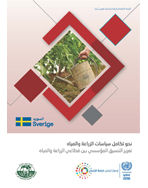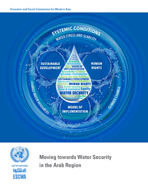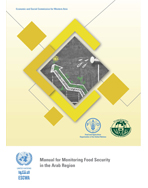Promoting Food and Water Security Through Cooperation and Capacity Development in the Arab region

Background
One of the main priorities for countries of the Arab region is to achieve food security for all. However, with a current population exceeding 360 million that is expected to double by the year 2050 if growth rates persist, ensuring food availability in quality, quantity and over time is not an easy task. Achieving this goal presents a major challenge because of the many constraints faced. These include notably the rapidly increasing water scarcity, which is exacerbated by the impact of climate change and extreme weather events. Other challenges include dwindling arable lands, unsustainable production and consumption patterns, changing lifestyles, the increasingly degraded environment and the rising uncertainty due to on-going socio-political transformations and unrests.
Aim
The project aims to promote food and water security in the Arab region through improved and coordinated policy design, strategy development and programme implementation. This is to be achieved by strengthening the national and regional knowledge base, capacity development and greater regional cooperation.

Strategy
To achieve the above aim, the project will strive to accomplish the following four strategic objectives over a period extending to December 2018:

Project Partners:
Donor:
Implementing Partners:
The project will be implemented in partnership, cooperation and coordination with member countries and the following organizations:
- League of Arab States and its Ministerial Councils and Specialized Agencies
- Arab Center for the Studies of Arid Zones and Dry Lands (ACSAD)
- FAO Regional Office for the Near East and North Africa
- International Center for Agricultural Research in the Dry Areas (ICARDA)
- Deutsche Gesellschaft für Internationale Zusammenarbeit (GIZ)
- American University of Beirut
- Arabian Gulf University
- King Saud University
Components
Component I: Assessing the impacts of changing water availability on agricultural production
The emergency Arab food security programme anticipates increasing agricultural production partly through horizontal expansion, where additional water requirements are to be satisfied from savings expected from increasing irrigation water efficiency projects. This proposal assumes that future availability of water resources will continue at historic or current levels. However, a closer look at the water availability situation in the region suggests that greater variability is increasingly expected as a result of the impacts of climate change.
Component I of the project aims to validate this assumption by engaging in an exercise that forecasts agricultural production in relation to the projected variability of water availability at the regional and national levels. This requires reliable projections of climate and hydrological parameters at the regional and national levels, which can be obtained from the outputs of the Regional Initiative for the Assessment of Climate Change Impacts on Water Resources and Socio-Economic Vulnerability in the Arab Region (RICCAR).
Component II: Coordination between food and water sectors
Management of water resources in an integrated manner and its crosscutting role in sustainable socio-economic development will need to be incorporated and embedded to a greater extent in the mindset of the agriculture sector when developing strategies and action plans related to the use of the increasingly scarce water resources.
Component II of the project strives to achieve greater coordination between agriculture and water institutions as a pre-requisite for coherent and integrated policy development. This is especially relevant now that food security is being accepted as a multi-dimensional issue that encompasses, besides agricultural production, other social, economic and environmental dimensions.
Component III: Efficient, safe and quality food production in the Arab region
The strategy for sustainable Arab agriculture highlights the importance of Good Agricultural Practices (GAPs), in boosting production, facilitating greater access to external markets for agricultural products, and complying with standards of international trade. Despite the fact that many of the activities and initiatives of the emergency Arab food security programme aim at improving agricultural production, in terms of quantity and quality, it does not include a proposal to develop a unified set of GAPs in the Arab region.
Component III of the project aims at the development of a framework guideline that promotes the adoption of good agricultural practices in the Arab region. This can be seen as an initial step towards the establishment of regional binding standards on agricultural production and trade.
Component IV: Assessing the status of food security
Despite the fact that the Arab region strives at higher levels of food security, it remains unclear how to assess the level of achievement. This is not a challenge that is specific to the Arab region, since measuring food security is a complex endeavor that involves many parameters.
Component IV of the project aims to develop a clear vision of what constitutes food security within the Arab regional setting, taking into consideration the regional specificities and global directions. Such a vision will need to be translated into a set of indicators to be used to monitor the state of food security at the national and regional levels.








